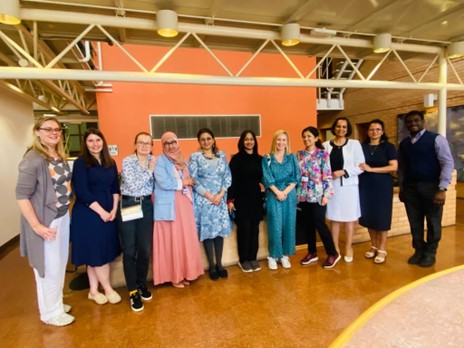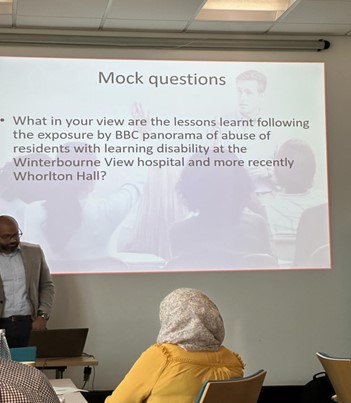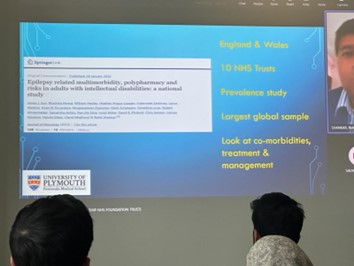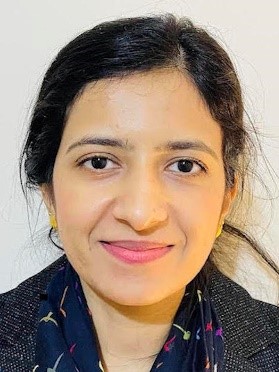Higher Training In Psychiatry Of Intellectual Disability
The East of England School of Psychiatry have responsibility to quality assure training in psychiatry in the East of England. The school will work closely with the Royal College of Psychiatrists, Universities and NHS trusts to produce the highest quality of postgraduate training in psychiatry and create opportunities to make its future generations of psychiatrists the best in the country. The programme is particularly strong in providing opportunities to develop leadership and management skills for higher trainees.
Please expand below blue boxes for further information on higher training in Psychiatry of Intellectual Disability.
Over two decades ago, the UK underwent a significant shift in terminology regarding individuals with cognitive challenges, replacing the outdated term "mental retardation" with the more inclusive language of "learning disability" or "intellectual disability." This transformation was prompted by evolving international perspectives and a growing recognition of the need for sensitive language in describing individuals with intellectual disabilities. Collaborating with the Learning Disabilities Observatory, recommendations were made to the WHO for an update, leading to the removal of the term in the latest classification system, ICD-11, launched in 2022. Advocates for individuals with intellectual disabilities assert that such changes are vital, as terms like "mental retardation" carry negative connotations, are offensive, and contribute to misunderstandings about the nature of the disorder and the value of those affected. The global move towards adopting inclusive language reflects a commitment to respecting the dignity and worth of all individuals.
The East of England is one of the UK's most thriving and vibrant regions. Centred around the major towns and cities in the counties of Cambridgeshire and Peterborough, Bedfordshire, Hertfordshire, Norfolk, North Essex and South Essex; the East of England is conveniently located, affordable and the home of world-class sport, culture and arts.
The geography of the region means that training programmes are carefully designed to maximise your experience without the need for you to face a lengthy commute or to move home and means you and your family can put down roots. In addition, the East of England offers fantastic days out and great living.
As well as a superb training programme and great experience in the East of England also gives you a great work/life balance. Average house prices are much lower than London and in your down time you can enjoy some of the country's most beautiful countryside.
Choosing Psychiatry of Intellectual Disability (ID) is a compelling decision driven by the field's captivating, intricate, and highly rewarding nature. This specialty offers a holistic perspective, allowing practitioners to delve into the intricate interplay between mental and physical health, behaviour, and development.
As a lifespan specialty, it presents a unique opportunity to cultivate skills and experiences in addressing the diverse needs of patients from childhood to old age. Psychiatry of ID/Learning Disability is intricately connected to other pivotal branches, including Neurodevelopmental Psychiatry and Forensic Psychiatry, providing a comprehensive understanding of related disciplines. The field promises a highly fulfilling career, and the East of England stands out as an excellent training ground for developing essential skills and confidence that will prove invaluable throughout one's professional journey.
This is a three-year training programme in Psychiatry of Learning Disability at ST4-6 aimed at doctors who can demonstrate the essential competences to enter this level of training. The programme is designed to support training for a CCT in Psychiatry of Learning Disability. Subject to satisfactory progression, the anticipated outcome on completion of this programme is a Certificate of Training in Psychiatry of Learning Disability. The programme is based in community and inpatient facilities provided for people with Learning Disabilities in the region.
The aim is to provide a comprehensive training in the Psychiatry of Intellectual Disability affording clinical, research and managerial experience. This will enable specialty trainees on completion of the Scheme to successfully apply for consultant posts in the Psychiatry of Learning Disability.
Our scheme is one of the most highly regarded learning disability rotations in the UK, offering a wide breadth of training opportunities. The trainee will be expected to rotate between their choices of three of these posts during their training, spending minimum of 12 months in each placement. Trainees can, by agreement, gain experience appropriate to their training needs outside the scheme.
There are also GP/FY/CT2-3 trainees attached to some posts. The full complement of core and advanced trainees (plus occasional flexible trainees) ensures a robust and lively peer group.
Higher Training in Psychiatry of Intellectual Disability takes between three and five years depending on whether a single Certificate of Completion of Training (CCT) is sought or a dual. The Higher Trainee builds on their Core Training to manage with an increasing level of sophistication and assurance the full range of Psychiatric presentations seen within Psychiatry of Intellectual Disability. Development of leadership and management skills are of increasing importance alongside developing the skills that will enable the Trainee to be seen as an essential component of teams within which they will work as a Consultant. Supervision from experienced Consultant Trainers is an essential part of the process.
On joining the Psychiatry programmes, doctors immediately register with the College. The College holds predicted Certificate of Completion of Training (CCT) dates, and gives more information at: http://www.rcpsych.ac.uk/studypsychiatry.aspx
The Royal College of Psychiatrists also provides personal trainee reflections, and more on the background, on the three years in a higher training programme (ST4-ST6).
Trainees are expected to become an integral part of the community and the inpatient Multidisciplinary team, working closely together with staff from all disciplines and attending the team meetings. They will also become involved in much inter-agency work. Under supervision they will see new referrals and patients for follow-up. Trainees will have the opportunity to develop their leadership and management skills. They will attend the weekly academic meeting and be expected to contribute to teaching and training sessions. They will receive regular weekly supervision and clinical support and supervision at other times during the week as required. Trainees will take part in an on-call rota during week-days, evenings and week-ends.
- Assessment and management (under supervision) of people with learning disabilities referred to the service with additional mental health difficulties, including mental illness, multiple and complex disabilities, challenging behaviour, autism, epilepsy, personality disorders and offending behaviours. This includes exposure to a diverse range of experiences, seeing patients across the spectrum of learning disabilities and mental disorders, across various settings including inpatient, outpatient, community, and emergency contexts.
- To develop leadership and management skills through learning about the operational aspects of the learning disability service, including participation in service-wide meetings such as clinical governance sessions.
- Gaining an appreciation of the strata of secure services.
- Participation in training opportunities to other sectors e.g. the Tribunal Service, Police Service, Probation and residential and supported tenancy staff (particularly during patient transitions.
- Development of skills in understanding Part 3 of the Mental Health Act and support in preparing evidence for tribunals and potentially Court proceedings.
- Support in presenting evidence in tribunals, Care Programme Approach (CPA) meetings, and case presentations.
- Regular participation in supervision sessions with the clinical supervisor (minimum one hour weekly) to identify competency areas for development, opportunities for learning, progress monitoring (including regular appraisals throughout the placement), and a forum for addressing any other relevant issues as needed.
 (By Dr Sonika Bhasin, Consultant Psychiatrist in Learning Disabilities and Training Programme Director for Higher Trainees LD (EOE))
(By Dr Sonika Bhasin, Consultant Psychiatrist in Learning Disabilities and Training Programme Director for Higher Trainees LD (EOE))
Please find the details of rotational placement for Higher training in LD psychiatry of East of England as below.
|
S.No |
Base |
Services |
Supervisor |
Contact details |
|
|
|
Hertfordshire |
|
|
|
1. Herts HPFT |
Marlowes Health and Wellbeing centre Hemel Hempstead, Hertfordshire. (covers Dacorum) |
Community LD services with psychiatry, Epilepsy and memory clinics. access to Autism assessment |
Dr Sonika Bhasin |
|
|
2. Herts HPFT |
Colne house, Upton road,Watford Hertfordshire. (cover Watford and 3 rivers) |
Community LD services with psychiatry, Epilepsy and memory clinics. access to Autism assessment, psychotherapy in LD |
Dr Anu Sharma
|
|
|
3. Herts HPFT |
Saffron House,Stevenage, Hertfordshire/Dove ward Radlett |
Community LD services and Acute inpatient treatment services (Dove ward) |
Dr Claire Reynolds |
|
|
4. Herts HPFT |
Saffron House,Stevenage, Hertfordshire |
Community LD services covering east Hertfordshire |
Dr Paul Bradley |
|
|
5 Herts HPFT |
Warren Court,Abbots Langley,Hertfordshire
|
Forensic LD inpatient services including both Medium and low secure units |
Dr Vittoria Pezzoni |
|
|
|
|
BEDFORD
|
|
|
|
1. Bedford ELFT |
Twinwoods,Clapham, Bedford |
Community LD services and IST |
Dr Afia Ali |
|
|
|
|
Cambridge and Peterborough
|
|
|
|
1 Cambridge CPFT
|
South Cambridge |
Community LD Services |
Dr Maggie Labib |
|
|
2.CPFT |
Hollies - The Cavell Centre Edith Cavell Healthcare Campus Bretton Gate Peterborough
|
Community LD services and Acute inpatient treatment services |
Dr Nauman Khalil |
|
|
1.Norfolk HPFT |
Broadland clinic Norfolk |
Community LD services and Forensic Unit |
Dr Regi Alexander |
|
|
|
|
ESSEX
|
|
|
|
1.Braintree HPFT |
Tekhnicon House, Springwood Drive Braintree,CM7 2YN
|
Community LD services |
Dr Alaa Martin |
|
|
2.Colchester HPT |
Victoria House Lexden Hospital London Road Colchester |
Community LD services and Acute inpatient treatment services |
Dr Sophie Shardlow |
|
|
3.Billericay EPUT |
Billericay |
Community LD services and Acute inpatient treatment services |
Dr Tom Picton |
|
Combined LD CAMH placement with Dr Anton in Cambridge: anton.krutskikh@cpft.nhs.uk
(By Dr Alexandra GABRIELSSON, Higher trainee in psychiatry of Intellectual Disability)

Research into the specific needs of people with intellectual disabilities has historically been an underfunded and understudied area, and the evidence base used in daily practice is largely based on data extrapolated from randomized controlled trials conducted in the general population.
Fortunately, this is changing, and research is becoming more inclusive to generate findings that are representative of this specific patient population. Co-production which actively involves people with intellectual disabilities and/or autistic people in research is also an area which is receiving more attention!
There is still a lot of work to be done, and so there are endless opportunities to get involved with exciting research projects in epilepsy management, autism spectrum disorders and ADHD to name a few. I have personally found the intellectual disability research community to be very supportive to trainees who wish to take part, and I have been able to tailor projects to my specific interests. It feels extremely rewarding to see the work invested contribute to our growing understanding of the specific needs of this patient cohort, and ultimately help us provide better care and support.
In the East of England region, we annually host in-person regional conferences, with our most recent event taking place on May 26, 2023, at the Fielder Centre in Hatfield. Our conferences feature insightful lectures covering a range of topics pertinent to Intellectual Disability Psychiatry. Previous sessions have explored themes such as 'Why Choose LD Psychiatry,' 'Addressing the Decline in Down Syndrome,' 'Advancements in Research within LD Psychiatry,' 'Understanding Epilepsy and Intellectual Disability,' 'Navigating Trauma and Abuse in PWLD,' 'Transitioning to a First Consultant Job,' and 'Developing Medical Leadership Skills. Please find pictures of this conference as below:



Additionally, we offer a monthly "Higher Training Teaching Programme" through webinars, accessible both in-person and virtually. These sessions are led by higher trainees and draw attendance from consultants and on occasion CTs, SAS doctors in LD placement in the region, providing a platform for ongoing education and collaboration.
 (By Dr Saher Binnat Rafiq, ST5 Specialty Registrar in Psychiatry of Intellectual Disabilities and LD Higher Trainee Rep)
(By Dr Saher Binnat Rafiq, ST5 Specialty Registrar in Psychiatry of Intellectual Disabilities and LD Higher Trainee Rep)
The EOE school of psychiatry also offers special interest session which you can find as attached.
Hertfordshire
| Supervisor | Dr Sonika Bhasin |
|---|---|
| Contact Details | sonika.bhasin1@nhs.net |
| Location | Marlowes Health and Wellbeing Centre, Hemel Hempstead |
| Description of opportunity |
Opportunity to get experience in Specialist assessment for PWLD with Epilepsy in our Epilepsy clinic. Also specialist Memory clinic run at Marlowes which entails memory assessment for PWLD using various screening tools and other assessment tools. Gain experience in assessment and management of dementia in PWLD. Required to attend Epilepsy clinic (twice a month on Fridays) and Memory clinic run once a month at Marlowes |
| Supervisor | Dr Vittoria Pezzoni |
|---|---|
| Contact Details | vittoria.pezzoni@nhs.net / jyotipadhiar@nhs.net |
| Location | Based at Warren Court (LD-MSU) Abbots Langley WD5 0HT |
| Description of opportunity |
Tuesday and Thursday all day from 10:00 to 18:00. MDT Ward Rounds / MDT meetings / Professional meetings / CPA & CTR Meetings This is a Secure Unit so some restrictions apply: No Mobiles / No Apple watches or similar /Laptop will need to be declared at reception / No metal cutlery /No tins / No large bottles / No sharps objects etc |
| Supervisor | Dr Kamalika Mukherji Dr Anu Sharma |
|---|---|
| Contact Details | |
| Description of opportunity |
LD training in HPFT offers simulation as special interest lead by Dr Kamalika Mukherji and Dr Anu Sharma |
Norfolk
|
Supervisor
|
Dr Regi T Alexander, Consultant Psychiatrist, Hertfordshire Partnership University NHS Foundation Trust |
|---|---|
| Contact Details | regialexander@nhs.net |
| Location | Little Plumstead Hospital, Norwich NR13 5EW |
| Description of opportunity |
This special interest opportunity offers an introduction into forensic mental health issues of people with developmental disorders including autism. You can be involved in a range of service evaluation and/or other research projects in a centre with a strong publication record of multi-disciplinary research and active academic links with a range of universities and service providers www.forensiclearningdisability.com
|
| Trainee Requirements | Forensic, General Adult, Learning Disability (1 session/ week) |
| Supervisor | Ekkehart Staufenberg |
|---|---|
| Contact Details | ekkehart.staufenberg@nhs.net |
| Location | Norfolk |
| Description of opportunity |
|
| Trainee Requirements | Able to travel to Norfolk |
More opportunities for Special Interest:
(By Dr Olurotimi Adejumo, ST6 Specialty Registrar in Child & Adolescent Psychiatry and Psychiatry of Intellectual Disabilities)

The NHS East of England region hosts higher trainee posts for joint training in Psychiatry of Intellectual disabilities and Child and Adolescent Psychiatry. These dual posts provide a unique opportunity for interested trainees to develop joint competence in addressing mental health issues unique to each of these populations.
The dual ID/ CAMHS training programme spans five years of psychiatric higher training. Two of these five years usually involve rotations in Intellectual disability, and two in Child Psychiatry posts, with the fifth year designed to be spent in specialist Learning Disability/ CAMHS posts.
In my experience, the dual ID/CAMHS training has offered a broad range of experiences with working with vulnerable people across the lifespan. Between rotations, I have developed a valuable understanding of mental health-related needs at different stages of life, with a growing awareness of the roles of individual and environmental factors in mental health presentations, as well as their outcomes. I believe this has helped make me a more resourceful psychiatrist and I would certainly recommend the dual ID/CAMHS specialty to any interested trainee.
(By Dr Anu Sharma, Consultant Psychiatrist in Learning Disabilities)

At East of England region, we are dedicated to pioneering innovative learning and development opportunities, particularly through our Simulation Hub. Our Simulation Training Facility, developed by Hertfordshire Partnership University Foundation Trust, is a groundbreaking initiative within the Trust, designed to provide innovative simulation training in mental health, physical health and learning disabilities.
Simulation is a fantastic experiential learning modality offering participants the chance both to engage in high fidelity scenarios and reflect as a group on the challenges and issues raised. People learn most effectively when training is interactive, immersive and replicates real life. Simulation replicates a real-life scenario, but in a psychologically safe and controlled environment.
Our approach to simulation-based learning (SBL) focuses on structured activities that represent real-life situations in education and practice. This learner-centred method involves small group learning through problem-based learning, case-based learning, and role plays with a guide on the side.
Each training session involves simulated characters such as patients, carers, or assessors, along with facilitators and observers (learners). We specialise in scenario-based simulation, which is proven to enhance team working, communication skills, risk assessment, and managing challenging behaviours.
In designing each scenario, we follow a comprehensive process including preparation, briefing, simulation activity, debriefing and feedback, reflection, and evaluation. During debriefing, we guide participants through three key stages: reactions, understanding, and summarisation. This ensures that lessons learned are effectively applied to real-life situations and future events.
Simulation training offers numerous advantages, including improving patient safety by allowing practice in simulation rather than on actual patients, enhancing healthcare provider performance in crisis events, promoting reflection and critical thinking, refining psychomotor skills, and fostering communication skills and interprofessional collaboration.
To find out more about training in Psychiatry, please visit the Royal College of Psychiatrists website at www.rcpsych.ac.uk
For more information on training in Psychiatry of Intellectual Disability, contact our Training Programme Director:
 Dr Sonika Bhasin
Dr Sonika Bhasin
The Marlowes Health & Wellbeing Centre
39-41 Marlowes
Hemel Hempstead
Hertfordshire HP1 1LD
Tel: 01442 275 661
email:sonika.bhasin1@nhs.net
You can also contact LD Higher Trainee Rep, Dr Dr Saher Binnat Rafiq , ST6 Specialty Registrar in Psychiatry of Intellectual Disabilities:

Dr Saher Binnat Rafiq
South Cambridgeshire LDP Team
Sunley House
Summers Hill Drive
Papworth Everard
CB23 3AB
